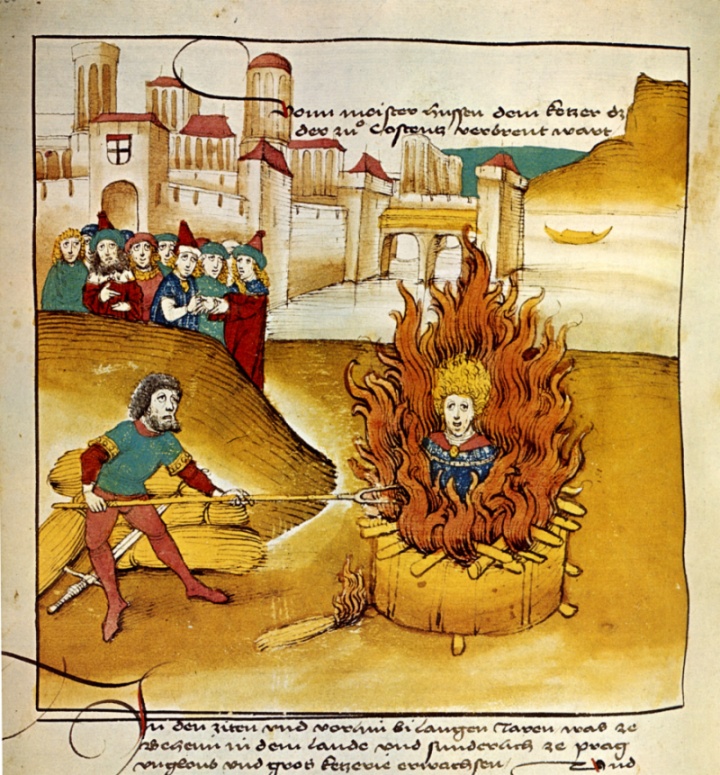Pagan gods became Christian saints. “Apostolic poverty” was forgotten. Puritanism has been a recurrent heresy of the Christian church; a confrontation between the “unforgettable age of the apostles,” this imaginary church, and the great department of state the real church was, with fire and faggot…

The first heretic was Simon Magus, mentioned in the Acts. Later writers accused him of being able to fly. Benozzo Gozzoli’s painting, shows him aloft, supported by demons, and also grounded, fatally grounded….Image: Wiki
The first “puritan” heretics were the Donatists of the fourth century. They were strong in rural North Africa- always a puritan area, even when it became Islamic in religion. They believed that corrupt, or time-serving priests, the priests, in fact, who had complied with the persecuting edicts of Diocletian, invalidated the sacraments which they administered, a moral view no established church can afford to hold.
In eightyh century Byzantium there was another puritan revolt, this time headed by puritan emperors, against the “images,” the costly pagan magnificence of the Church. And this “iconoclastic” movement has recurred often since. We thin kespecially of Reformation Europe and Cromwellian England, when preachers, distinguishing between “the living images of god,” mankind for whom Christ died, and the “dead images” of the Church to which they had been sacrificed, led mutinous crowds to topple the statues, slash the pictures, hew down the organs, and shatter the stained-glass windows of the Gothic churches.
With puritanism-the hatred of poverty and wealth- went evangelical poverty and community of property; sometimes also refusal of military service or of infant baptism. The established church always distrusted these subversive ideas, but in every centruy little communities of heretics clung to them. The monasteries- at least in their beginnings- were “communist bodies within the Church, and the friars- again in their beginnings- were exponents of apostolic poverty. But monasteries and friars soon became rich and corrupt; their original doctrines were condemned; and the communities which clung to them were denounced as heretics.

—Then there was the Jesuit from that beautiful church located in that well-known locality in the outskirts of London. The Gospel reading of the day included one of Our Lords’ (actually rather frequent) mentions of Hell, and in order to avoid the sensitivities of the present to be “hurt” our man hastened to point out that when Jesus spoke about Hell he meant we should not be happy with second best (or with imperfect choices, or the like; I don’t remember the exact words, but I certainly remember their exact meaning). That left me breathless; but again, this was a Jesuit, and they know how to do heresy in the oiliest of ways. I was angry and upset, but not surprised.
Recently – at another one of those NO churches where yours truly occasionally attends to in order to take the temperature of modern everyday, wannabe cool Catholicism – it happened again, and it was not pleasant. Also, this time as soon as I smelled the theological rat I went to extraordinary extents of concentration…
Frankly, what I heard was somewhere between scary and satanic.—Read More:http://mundabor.wordpress.com/2012/05/20/the-great-salvation-sale/
Nevertheless, such communities have continued to appear, from the Waldenses of the twelfth century to the Shakers and other utopian communist sects of nineteenth-century America. The fifteenth-century Bohemian Brethren, the seventeenth-century Quakers, and other sects refused military service, just as the early Christians had done under the pagan empire. Infant baptism was rejected by numerous sects, of which the sixteenth-century Anabaptists were by no means the first. Such rejection emphasized that church membership was not hereditary or automatic but a rational “choice” – a heresy.






 COMMENTS
COMMENTS